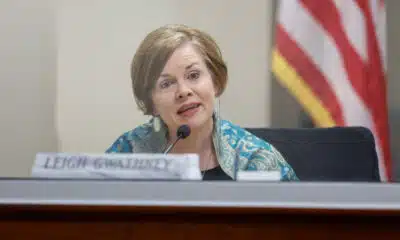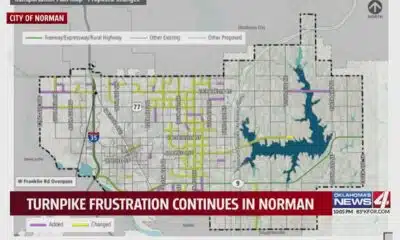News from the South - West Virginia News Feed
Jay’s Evening Weather for March 14th, 2025
SUMMARY: The weather in southern West Virginia will remain pleasant this evening with mild temperatures, but lower humidity and breezes create an elevated brush fire risk. This weekend, expect showers and thunderstorms from Saturday evening through Sunday, some of which could be strong, with heavy rain leading to ponding on roads and water accumulation in low-lying areas. Cooler temperatures are forecast for the start of next week, with highs dropping into the 40s and 50s by Thursday and Friday. A slight risk of severe weather exists, with a marginal risk in the area. Keep an eye on weather alerts for updates.
After a breezy and pleasant day around the area, big changes are coming through the weekend, and the unsettled weather continues into the next work week.
News from the South - West Virginia News Feed
Investigation: WV counties spend opioid crisis money on jail instead of recovery
by Claudia Di Lima, West Virginia University, West Virginia Watch
July 8, 2025
In rural Wyoming County, West Virginia, Ann Reed is the sheriff’s department’s only social worker.
Funded through a temporary grant from a local mental health center, Reed provides resources and care to individuals who experience substance use disorder on a daily basis.
She assists the Wyoming County Sheriff’s Department by monitoring a local mental health agency’s 911 calls and checking if any are drug-related. If they are, Reed then responds to individuals at their homes, taking them to treatment facilities — and sometimes, witnessing their arrests.
“We pick up, we arrest, we send off,” Reed said.
Usually, the place they send them off to is jail.
Wyoming County is one of the state’s most rural. It’s home to about 20,000 residents, but no hospital and zero certified treatment beds, according to the West Virginia Office of Drug Control Policy. As the nation’s opioid overdose epidemic raged, Wyoming County had a prescription overdose death rate of 54.6 per 100,000 people from 1999 to 2014 — the highest in the nation.
The county still battles the lasting effects of the opioid crisis. It has 12 certified female beds and one comprehensive behavioral health care provider to help them do it. But like communities across the country, Wyoming County is getting hundreds of thousands of dollars through opioid lawsuit settlements to spend on law enforcement, prevention education, treatment, recovery and harm reduction services.
West Virginia will receive an estimated $980 billion over the next 17 years from a global settlement, agreed to in federal court, of a class action lawsuit brought by states, counties and cities across the country against opioid distributors, manufacturers, pharmaceutical companies and others, in the wake of the country’s opioid epidemic.
Wyoming is one of at least 9 counties in West Virginia that have used their opioid settlement funds to pay off at least a portion of their regional jail bill, an analysis of Freedom of Information Act requested documents by students from West Virginia University’s Reed School of Media from 50 of the state’s 55 counties shows. In total, those nine counties have spent more than $3.5 million on bills to house West Virginians in its 10 regional jails.
“In small counties, we unfortunately are limited financially,” Grant County Commissioner Kevin Hagerty said in an email. His county spent half of their settlement funds — $115,528 — on their regional jail bill. “The jail bill has been a pretty significant expense for us over several years. We used a portion of the funds to help ease the burden on resources.”
As part of an investigation into these practices, Reed School of Media journalism students reached out to county commissioners in all nine counties that reported spending opioid settlement funds on jail bills. Representatives from four counties responded, and all said spending the opioid settlement funds in this way aligns with what is allowed in state rules for spending, written by the West Virginia Attorney General’s Office.
But experts say there is a difference between how the funds can legally be spent and the intent behind the global settlement that was the result of hundreds of thousands of overdose deaths across the country.
A crisis-fueled debt
Jail fees pose a significant burden on counties in West Virginia, where taxpayers are ultimately on the hook for the bill. Documents from the state’s Department of Homeland Security show several counties owe millions of dollars in jail fees.
As of April 4, 2025, the 55 counties in West Virginia owe a total of $15,020,710.48 on their regional jail bills. Clay, McDowell and Webster counties owe the most — and, according to a source familiar with the state’s jail payment processes, have for the past decade.
How state, county and city leaders can spend their opioid settlement funds is guided by an MOU that former Attorney General Patrick Morrisey — now governor — helped to establish in 2022. The MOU outlines that funds can be spent in several areas: prevention, treatment, recovery, law enforcement and EMS.
Under law enforcement, the MOU specifically says funds can be used for evidence-based programs for individuals who are incarcerated or are exiting incarceration, education and training programs for law enforcement personnel, mental health and support resources, equipment, tools and manpower for first-responder agencies.
The MOU acknowledges regional jail fees as an approved use of opioid lawsuit settlement funding, saying it provides “restitution for monies that were previously expended on opioid abatement activities.”
And several counties have decided putting money toward these overdue bills is a priority. In Wyoming County, Commissioner Jason Mullins said many people in the regional jail are incarcerated for opioid-related offenses, so it’s a logical use for the funds.
Logan County is spending nearly a million of its $3.9 million fund on its jail bill. In Boone County, officials are putting $452,766 of opioid settlement funds toward that use.
“If a Madison police officer makes an arrest inside city limits, Boone County is still responsible for the jail bill,” Boone County Commissioner Brett Kuhn said. “So that’s a very difficult thing when you’re in the economic condition we find ourselves in today to come up with.”
Kuhn says Boone County usually owes $60,000-$70,000 per month on their jail bill, and uses the county’s portion of the coal severance tax revenues to pay it off. He says using opioid settlement funds instead of the coal severance tax to pay the jail bill will allow them to redirect severance funds to other economic development opportunities in the county.
“I think one of the most important ways to combat the situation we find ourselves in now is to create good, high-paying jobs,” Kuhn said.
Several county officials say the decision to pay off their jail bills first stems from a lack of funding to pay down what they owe. Commissioner Kevin Hagerty said the Grant County Commission also has plans to use its funding to assist in opening a nonprofit sober living house.
“Before we commit to funding, there are various things that we must consider, such as liability issues, operational structure, who would oversee different mechanics of the house, etc.,” he said. “We are pretty early in the process; however, it is something that we see as very positive if it were to come to fruition.”
The commission has already approved the building of a Safe Haven Baby Box with the settlement funds.
Laura Lander, addiction therapist and associate professor at West Virginia University’s School of Medicine, says there are other ways the funds could be spent that would offer long-term support for people affected by substance use.
Lander, a past opioid settlement grant review panelist for the West Virginia First Foundation, said that things like child advocacy centers, youth prevention and workforce development would be more effective spending.
Lander said that using the money on “short-sighted” areas like the jail bill are not going to help people who are struggling.
“It’s not going to address the problem, it’s just going to pay a bill,” she said. “I’m sure everybody has regional jail bills, but it’s not actually addressing the problem. It sounds like it’s addressing a shortfall in the county’s budget or planning.”
Some county officials agree. In Mercer County, Commissioner Greg Puckett says other counties’ use of their settlement funds on the jail bill is understandable — but that doesn’t make it the best use of the money.
“I think it’s kind of a faulty philosophy,” Puckett said. “There are identified strategies that are a lot more effective in ways to deal with the opioid problems that we’ve seen in the past. Those come from building for future solutions, not looking in reverse.”
Instead of paying their jail bill — which was $163,000 for the month of May — Puckett said Mercer County wants to use their funds to improve infrastructure, including a new sheriff’s department building and parks for “engagement in positive activities.”
“When you pay the jail bill, that’s essentially a reverse thinking philosophy of just getting out from under it. You’re never going to be able to get out completely from under it because of the way the costs are,” he said.
Unlike Wyoming or Boone counties, Mercer County also plans to create a task force to help delegate funds that would include mental health experts and people in long-term recovery.
Frank Kearl is an attorney with Popular Democracy. He said he has been developing strategies to ensure transparency and accountability in opioid settlement fund spending alongside organizers and community activists in New York, Michigan and Pennsylvania.
Kearl said using the settlement funds to pay for regional jail bills is legal in his read of the West Virginia MOU and his understanding of the rules outlined by the global settlement, but said the legality of using the funds in a certain way and whether that’s the best use for them are different questions.
“Someone would need to be paying attention to where that money was going to ensure that two years from now, when they want to spend the money on something else that’s not related, there’s someone there to be like, ‘wait a second, you already spent all of this money in this other way, so you don’t have that remaining funds,’” Kearl said. “And that’s just not happening.”
“That’s not happening in West Virginia. That’s not happening anywhere. No one is paying close enough attention to where this money is going.”
Plus, Kearl said, this is West Virginia’s only shot — just like it is for every state. These funds will only come once. If they’re misspent from the start, government leaders cannot go back to the corporations that are part of the global settlement and sue for more.
And in the current MOU and settlement structure, there is no federal oversight. State, local and city governments have full control of the processes.
“The way that the settlements are set up prevents any subsequent liability for these corporations and individuals for the harm that they caused. So someone living in West Virginia, in one of these counties where this money is being spent on something that’s completely unrelated, they don’t have another bite at the apple,” Kearl said.
“This is their one opportunity to see meaningful justice served resolution,” he said. “Money spent in a way that is helping resolve the harms that they have suffered and continue to suffer, and so when that money is wasted, to me, it’s less even about the legality or illegality and more about the justice of it.”
What experts, communities say they actually need
Despite the MOU allowing the payment of regional jail fees, some activists say they’d like to see the money used in other ways.
Brittney Garrett is a representative of Police Assisted Addiction & Recovery Initiative, a national nonprofit organization that encourages people struggling with substance use disorder to go to a local police station to receive drug screenings and other recovery services without being arrested. Garrett helps individuals find pathways to treatment and provides guidance for law enforcement when they interact with people struggling with substance use disorder.
Garrett said allocating funding to law enforcement can be an effective measure, as long as the money is spent on programs specifically designed to benefit the community in accessing treatment and recovery services.
“We really need to make sure that it’s opioid-specific and that we are helping individuals who are struggling with substance use and connecting them to treatment and recovery to not continue this,” she said.
She encouraged county commissions to use other funding pools for treatment and recovery services.
Reporting in West Virginia shows some counties are spending their funds on a shooting range in Jackson County or a UTV for the police department in Ohio County.
“I think that there is other funding for things like shooting ranges or police vehicles,” Garrett said in response to the reporting.
Lander also said the counties need to look at long-term treatment solutions. She said purchasing new vehicles or new buildings is not sustainable, and if counties want to support infrastructure, the settlement money should go towards recovery housing.
“We have an affordable housing crisis in this state, that is, in my opinion, directly connected to the substance use disorder problem. And one of the reasons why it’s so difficult for people to get well is that they don’t have stable housing,” Lander said. “It’s very hard to be in recovery and not have a stable place to live.”
Kearl said county leaders need more guidance to ensure funds are distributed to areas outside of law enforcement or jail bills.
“Dropping $3 million in a county-level account and expecting them to use it in a way to resolve harms from a crisis that they didn’t create in the first place and that they were not actively participating in the settlement process at all is irresponsible by the state,” he said.
One county’s lingering struggle
In Wyoming County, Sheriff Bradley Ellison — who social worker Ann Reed works with directly — said there is a lack of resources for residents who have been affected by the opioid crisis and for emergency personnel like him who have responded to opioid-related emergencies for nearly two decades.
Ellison has worked at the county’s sheriff’s department for more than 30 years, responding to the opioid crisis on the front lines. His department consists of 18 officers, and Ellison said it’s understaffed and underfunded. And while he said he wasn’t sure what the Wyoming County Commission should spend its funding on, he said he needs things that will help his department continue to do their jobs, like new cruisers and an increase in personnel.
Ellison believes the county is unlikely to continue funding recovery, prevention, or treatment services once settlement funding runs out. He also said he was not against the use of opioid settlement funds to pay their jail bill.
“Like if you wanted a facility and it cost a million dollars, you’re blowing through your money. Are you helping anything? Because once this money’s gone, the county ain’t gonna pick it up and take it out of their coffers because it ain’t there,” Ellison said. “You got to try to hit the best way to make the biggest impact that you can with what you got.”
Despite current efforts to combat substance use disorders in the county, he said financial support came long after Wyoming County residents were experiencing the worst of the opioid crisis.
“They was 10 years too late on the opioid problem. We was crying and screaming in the early 2000s, ‘Help. Gosh, help.’ Nobody would listen,” Ellison said. “Nobody would listen.”
Ellison said he’s worried that they’re still too late to help the people who need it most.
This story was published in partnership with West Virginia University’s Reed School of Media and Communications, with support from Scott Widmeyer.
GET THE MORNING HEADLINES.
West Virginia Watch is part of States Newsroom, a nonprofit news network supported by grants and a coalition of donors as a 501c(3) public charity. West Virginia Watch maintains editorial independence. Contact Editor Leann Ray for questions: info@westvirginiawatch.com.
The post Investigation: WV counties spend opioid crisis money on jail instead of recovery appeared first on westvirginiawatch.com
Note: The following A.I. based commentary is not part of the original article, reproduced above, but is offered in the hopes that it will promote greater media literacy and critical thinking, by making any potential bias more visible to the reader –Staff Editor.
Political Bias Rating: Center-Left
This article presents a generally factual and detailed account of the opioid crisis’s impact on rural West Virginia, emphasizing challenges in funding, treatment, and law enforcement. The focus on social workers, addiction treatment, and criticism of spending opioid settlement funds on jail bills rather than long-term recovery solutions reflects a concern for public health and social justice, which aligns with center-left values. However, the article also includes voices from law enforcement and county officials explaining financial realities, maintaining balanced coverage. The critical tone toward the prioritization of jail fees over recovery funding slightly leans progressive but remains grounded in pragmatic concerns.
News from the South - West Virginia News Feed
Jay’s Evening Weather for 07/07/25
SUMMARY: Southern West Virginia had a warm afternoon, slightly above seasonal norms, with temperatures in the mid-80s and partly cloudy skies. Showers and storms are scattered across the region, mainly moving west to east along a frontal boundary to the north, bringing several rounds of rain over the next few days. While severe storms are unlikely, some stronger storms Wednesday into Thursday may produce gusty winds. Rainfall could cause localized ponding and minor flooding but not severe flooding. Temperatures will remain summer-like with highs in the low to mid-80s and lows in the 60s. Keep an umbrella handy for intermittent showers.
It is a seasonably warm afternoon around the region. There are scattered showers and storms around as well.
FOR ALL THE LATEST, BE SURE TO FOLLOW US ON FACEBOOK AND TWITTER:
https://facebook.com/WOAYNewsWatch
https://twitter.com/WOAYNewsWatch
News from the South - West Virginia News Feed
Cathy Coleman funeral details
SUMMARY: Cathy Coleman was involved in a car accident on May 1st in Greenup County, Kentucky, while taking her dog to get ice cream. Her granddaughter shared this information. Calling hours for Commissioner Coleman will be held Thursday from 2 to 8 p.m. at the Roger W. Davis Funeral Home in West Portsmouth. Her funeral service is scheduled for Friday at 11 a.m. at the Nauvoo Methodist Church in West Portsmouth. Ohio Governor Mike DeWine has ordered flags to be flown at half-staff across Scioto County and the Ohio Statehouse in her honor.
Cathy Coleman funeral details.
For more Local News from WSAZ: https://www.wsaz.com/
For more YouTube Content: https://www.youtube.com/channel/UCrcuU0JXXy8oIBqEB13mrwA
-
News from the South - Louisiana News Feed7 days ago
Attorneys who run public defender offices replaced amid contract turmoil
-
News from the South - Alabama News Feed7 days ago
Gov. Kay Ivey expected to name Alabama parole board pick in coming days
-
News from the South - Arkansas News Feed4 days ago
Real-life Uncle Sam's descendants live in Arkansas
-
News from the South - Kentucky News Feed7 days ago
In small-town Kentucky, finding ‘all the more reason to resist’
-
News from the South - Kentucky News Feed6 days ago
Man arrested after alleged strangulation of adult and juvenile
-
News from the South - Missouri News Feed6 days ago
Bank robbery suspect arrested in suburban home neighbors say they warned about
-
Mississippi News Video6 days ago
MHP holiday travel enforcement period begins
-
News from the South - Oklahoma News Feed6 days ago
Turnpike frustration continues in Norman












































